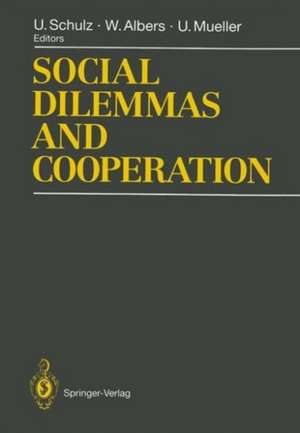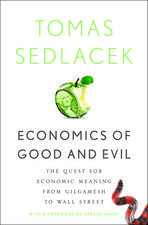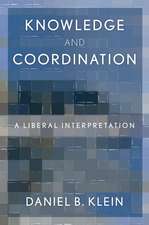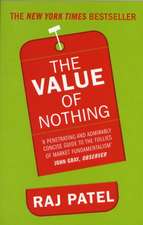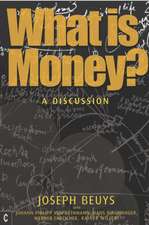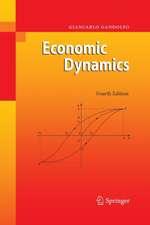Social Dilemmas and Cooperation
Editat de Ulrich Schulz Contribuţii de W. Albers, D.V. Budescu Editat de Wulf Albers Contribuţii de A. Crettenden Editat de Ulrich Mueller Contribuţii de A. Diekmann, T Doi, I. Erev, I. Eshel, M. Foddy, A. Franzen, R. G. Ardner, W. Güth, N. Hayashi, N. Jin, D.M. Kuhlmann, B. Latane, M. Lewenstein, W.B.G. Liebrand, R.M. Meertens, D.M. Messick, H.C. Micko, A. Nowack, H. Okuda, A. Ostmann, E. Ostrom, A. Rapoport, K. Ritzberger, E. Sansone, R. Suleiman, N. Takahashi, T. Takigawa, E. van Dijk, P.A.M. Van Lange, M. Van Vugt, R. Vollmeyer, J. Walker, M. Watabe, D. Weinshall, H. Wilke, T. Yamagishien Limba Engleză Paperback – 12 dec 2011
Preț: 960.42 lei
Preț vechi: 1171.25 lei
-18% Nou
Puncte Express: 1441
Preț estimativ în valută:
183.83€ • 199.75$ • 154.52£
183.83€ • 199.75$ • 154.52£
Carte tipărită la comandă
Livrare economică 21 aprilie-05 mai
Preluare comenzi: 021 569.72.76
Specificații
ISBN-13: 9783642788628
ISBN-10: 3642788629
Pagini: 556
Ilustrații: X, 541 p.
Dimensiuni: 170 x 244 x 29 mm
Greutate: 0.88 kg
Ediția:Softcover reprint of the original 1st ed. 1994
Editura: Springer Berlin, Heidelberg
Colecția Springer
Locul publicării:Berlin, Heidelberg, Germany
ISBN-10: 3642788629
Pagini: 556
Ilustrații: X, 541 p.
Dimensiuni: 170 x 244 x 29 mm
Greutate: 0.88 kg
Ediția:Softcover reprint of the original 1st ed. 1994
Editura: Springer Berlin, Heidelberg
Colecția Springer
Locul publicării:Berlin, Heidelberg, Germany
Public țintă
ResearchDescriere
A social dilemma is a game which at first glance has only inefficient solutions. If efficient solutions are to be achieved, some kind of cooperation among the players is required. This book asks two basic questions, closely intertwined with each other: 1. How is cooperation possible among rational players in such a social dilemma? Which changes in the social context of a social dilemma situation are necessary in order for players to rationally choose the cooperative option? 2. How do real players actually behave in social dilemma situations? Do they behave "rationally" at all? Or, conversely, what kind of reasoning, attitudes, emotions, etc. shape the behavior of real players in social dilemmas? What kind of interventions, what kind of internal mechanisms within a real group may change players' willingness to cooperate? These two general questions mark the broad spectrum of the problem which has been, over the last three decades, investigated in various disciplines, and which has brought many new ideas and new observations into the study of the old question of social order in a world of born egoists. Accordingly, this volume contains contributions by biologists, sociologists, political scientists, economists, mathematicians, psychologists, and philosophers.
Cuprins
Social orientation analysis of the common and individual interest problems.- Toward more locomotion in experimental games.- Individual reasoning process in the participation game with period.- The position effect: The role of a player’s serial position in a resource dilemma game.- Positive and negative mood effects on solving a resource dilemma.- Fairness judgements in an asymmetric public goods dilemma.- Group size effects in social dilemmas: A review of the experimental literature and some new results for one-shot N-PD games.- Provision of step-level public goods: Effects of different information structures.- Conditional contributions and public good provision.- Convergence in the orange grove: Learning processes in a social dilemma setting.- Leadership and group identity as determinants of resource consumption in a social dilemma.- Prisoner’s dilemma networks: Selection strategy versus action strategy.- Choice of strategies in social dilemma supergames.- Social dilemmas exist in space.- Commuting by car or by public transportation? An interdependence theoretical approach.- Evolution of norms without metanorms.- Computer simulations of the relation between individual heuristics and global cooperation in prisoner’s dilemmas.- What risk should a selfish partner take in order to save the life of a nonrelative, selfish friend? - A stochastic game approach to the prisoner’s dilemma.- Learning models for the prisoner’s dilemma game: A review.- Social capital and cooperation: Communication, bounded rationality, and behavioral heuristics.- Cooperation in an asymmetric volunteer’s dilemma game: Theory and experimental evidence.- Ten rules of bargaining sequences: A boundedly rational model of coalition bargaining in characteristic function games.- Aspiration processing in multilateral bargaining: Experiment, theory and simulation.- Resistance against mass immigration - An evolutionary explanation.- Authors index.
